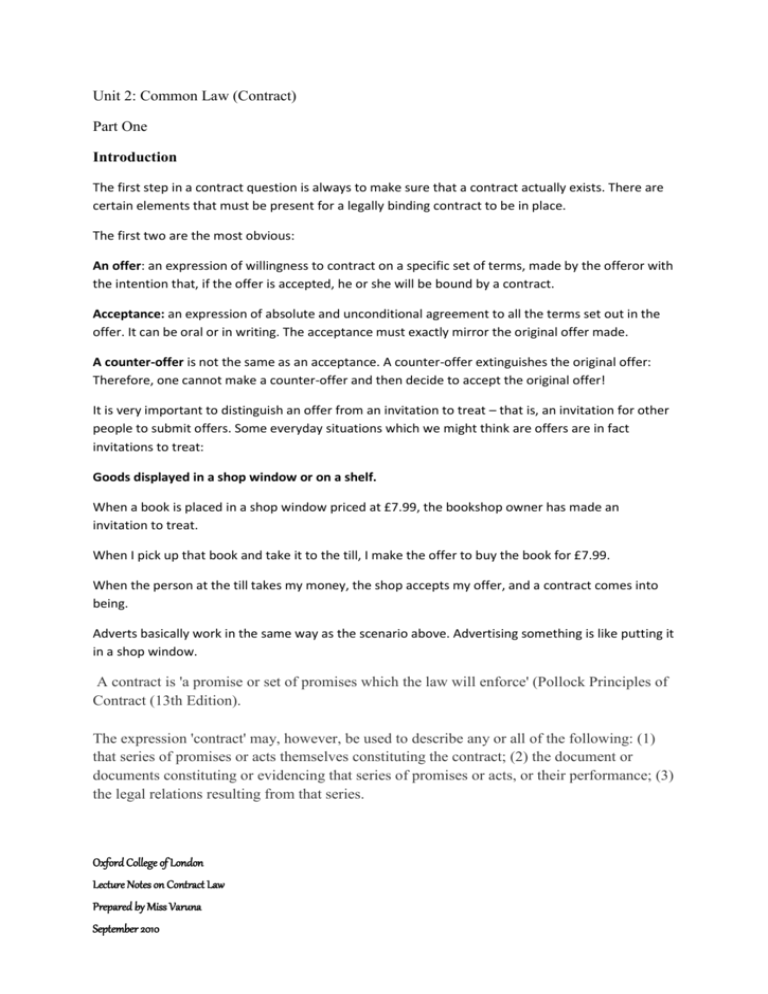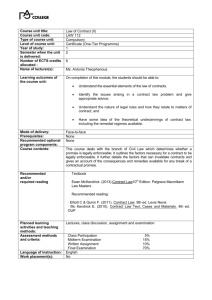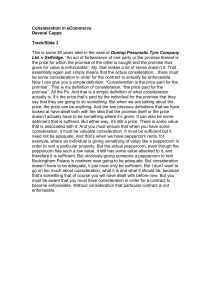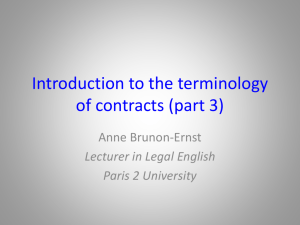Contract Law ( Part One)
advertisement

Unit 2: Common Law (Contract) Part One Introduction The first step in a contract question is always to make sure that a contract actually exists. There are certain elements that must be present for a legally binding contract to be in place. The first two are the most obvious: An offer: an expression of willingness to contract on a specific set of terms, made by the offeror with the intention that, if the offer is accepted, he or she will be bound by a contract. Acceptance: an expression of absolute and unconditional agreement to all the terms set out in the offer. It can be oral or in writing. The acceptance must exactly mirror the original offer made. A counter-offer is not the same as an acceptance. A counter-offer extinguishes the original offer: Therefore, one cannot make a counter-offer and then decide to accept the original offer! It is very important to distinguish an offer from an invitation to treat – that is, an invitation for other people to submit offers. Some everyday situations which we might think are offers are in fact invitations to treat: Goods displayed in a shop window or on a shelf. When a book is placed in a shop window priced at £7.99, the bookshop owner has made an invitation to treat. When I pick up that book and take it to the till, I make the offer to buy the book for £7.99. When the person at the till takes my money, the shop accepts my offer, and a contract comes into being. Adverts basically work in the same way as the scenario above. Advertising something is like putting it in a shop window. A contract is 'a promise or set of promises which the law will enforce' (Pollock Principles of Contract (13th Edition). The expression 'contract' may, however, be used to describe any or all of the following: (1) that series of promises or acts themselves constituting the contract; (2) the document or documents constituting or evidencing that series of promises or acts, or their performance; (3) the legal relations resulting from that series. Oxford College of London Lecture Notes on Contract Law Prepared by Miss Varuna September 2010 Definition of a contract A contract is an agreement that is enforceable by a court of law or equity. There are two parties to a contract: the offeror who makes an offer to enter into a contract and the offeree to whom an offer to enter into a contract is made. The Formation of Contracts: A valid contract requires: (1) An agreement (2) An intention to create legal relations (3) Consideration (unless the Contract is made by deed). Whilst each of these three requirements receives separate treatment, they must in reality be looked at together. Elements necessary to form a valid contract To have an enforceable contract, four elements must be present: Agreement—to have an enforceable contract, there must be an agreement between the parties. ( Offer and Acceptance) Consideration—the promise must be supported by bargained-for consideration that is legally sufficient. Contractual capacity—the parties to a contract must have contractual capacity. Lawful object—the object of the contract must be lawful. Intention to enter into legal relations. Capacity to Form a Contract: A valid contract may be made by any person recognised by law as having legal personality that is natural persons, corporations and the Crown. However, the following classes of persons are in law incompetent to contract, or are only capable of contracting to a limited extent or in a particular manner: (1) bankrupts; (2) minors; (3) persons of unsound mind; (4) Oxford College of London Lecture Notes on Contract Law Prepared by Miss Varuna September 2010 alien enemies; (5) drunkards; (6) corporations; (7) companies; (8) partnerships; and (9) receivers of companies. Contents of the Contract: The terms of a contract may be express or implied; and separate consideration is given below to one particular type of contractual term, namely exclusion clauses. Where a contractual term has been broken, it will, apart from the possible effect of any exclusion clause, probably give rise to a claim for damages for breach of the relevant contract, or of any collateral contract. Prima facie, the promisor will be strictly liable in the law of contract for failure to perform that which he promised to perform, unless his promise is impossible to perform; and this situation may be contrasted with an action in tort in respect of a broken promise, which will depend on the promisor's state of mind. Furthermore, the breach may in some cases give the promisee the additional right to rescind the relevant contract. Where the contract is one of consumer supply, there are statutory restrictions on the permissible terms. Privity of Contract: As a general rule, only a person who is a party to a contract has enforceable rights or obligations under it. This is the basis of the doctrine of privity of contract .At common law; a contract cannot confer rights or impose obligations on strangers to it, that is, persons who are not parties to it. The parties to a contract are those persons who reach agreement and, whilst it may be clear in a simple case who those parties are, it may not be so obvious where there are several contracts, or several parties, or both, for example in the case of multilateral contracts; collateral contracts; irrevocable credits; contracts made on the basis of the memorandum and articles of a company; collective agreements; contracts with unincorporated associations; and mortgage surveys and valuations. Despite some earlier doubts, in the mid-nineteenth century the doctrine of privity was accepted by the courts, though those doubts seem to have been resurrected in more recent times, albeit by a minority of cases. The privity of contract rule used to be regarded as intimately connected with the doctrine of consideration and the rule that consideration must move from the promisee. Vitiating Factors: There are situations where the parties have reached agreement but the question arises whether the existence or non-existence of some fact, or the occurrence or non-occurrence of some event, destroys the basis upon which that agreement was reached so that the agreement is Oxford College of London Lecture Notes on Contract Law Prepared by Miss Varuna September 2010 discharged or in some other way vitiated. That situation is sometimes described as 'mistake'. However, in utilising that description, the following distinction must be borne in mind: if mistake operates at all in contract, it operates so as to negative or in some cases nullify consent. A mistake negatives consent where, on ordinary offer and acceptance principles, it prevents any agreement coming into in existence. This may be because of a mistake as to the person with whom one is contracting, or as to the subject matter of the contract, or as to the terms of the contract. A mistake nullifies consent where the parties reach agreement, but that agreement may be nullified because that agreement was made under a fundamental mistaken assumption. In this circumstance, the effect of the mistake may differ according to whether the mistake renders the contract impossible to perform or not Sources of contract law Sources of contract law include: Common law of contracts Uniform Commercial Code Restatement of the Law of Contracts Bilateral and unilateral contracts A bilateral contract is entered into by way of exchange of promises of the parties-a promise for a promise. No act of performance is necessary to create a bilateral contract. A unilateral contract is a contract in which the offeror's offer can be accepted only by the performance of an act by the offeree-a promise for an act. Express and implied-in-fact contracts An express contract is an agreement that is expressed in written or oral words. An implied-in-fact contract is an agreement between parties that has been inferred from the conduct of the parties. Formal and informal contracts Formal contracts require a special form or method of creation. These can include contracts under seal, recognizances, negotiable instruments, and letters of credit. Contracts that do not qualify as formal contracts are informal contracts. Executed and executory contracts A contract that has been performed by both sides is an executed contract. Oxford College of London Lecture Notes on Contract Law Prepared by Miss Varuna September 2010 A contract that has not been performed by both sides is an executory contract. Valid, void, voidable, and unenforceable contracts A valid contact is a contract that meets all of the essential elements to establish a contract. It is a contract that is enforceable by at least one of the parties. A void contract is a contract that has no legal effect. A voidable contract is a contract where one or both of the parties have the option to avoid their contractual obligations. An unenforceable contract is a contract where the essential elements to create a valid contract are met, but there is some legal defense to the enforcement of the contract. Quasi-contracts Quasi-contracts are based on the doctrine of equity. In a quasi-contract, a court may award monetary damages to a plaintiff for providing work or services to a defendant even though no actual contract existed. This is to prevent unjust enrichment and/or unjust detriment. Equity in contracts Equity courts were developed in England to settle disputes where an award of money damages at law would not be a proper remedy or where fairness required the application of equitable principles. Sometimes, the doctrine of equity is applied in contracts cases. Explanation of Legal Terms in contract Law: Bilateral contract—A contract entered into by way of exchange of promises of the parties: a "promise for a promise." Common law of contracts—Contract law developed primarily by state courts. Equity—A doctrine that permits judges to make decisions based on fairness, equality, moral rights, and natural law. Executed contract—A contract that has been fully performed on both sides: a completed contract. ( Already carried out or performed) Executory contract—A contract that has not been fully performed. With court approval, executory contracts may be rejected by a debtor in bankruptcy. ( to be performed in the future and not yet acted on) .The court may well feel free to conclude that no agreement has been reached and hence refuse to enforce it. Express contract—An agreement that is expressed in written or oral words. Formal contract—A contract that requires a special form or method of creation. Implied—in—fact contract—A contract where agreement between parties has been inferred from their conduct. Informal contract—A contract that is not formal. Valid informal contracts are fully enforceable and may be sued upon if breached. Legally enforceable contract—If one party fails to perform as promised, the other party can use the court system to enforce the contract and recover damages or other remedy. Oxford College of London Lecture Notes on Contract Law Prepared by Miss Varuna September 2010 Objective theory of contracts—A theory that says the intent to contract is judged by the reasonable person standard and not by the subjective intent of the parties. Offeree—The party to whom an offer to enter into a contract is made. Offeror—The party who makes an offer to enter into a contract. Quasi- or implied-in-law contract—An equitable doctrine whereby a court may award monetary damages to a plaintiff for providing work or services to a defendant even though no actual contract existed. The doctrine is intended to prevent unjust enrichment and unjust detriment. Restatement of the Law of Contracts—A compilation of model contract law principles drafted by legal scholars. The Restatement is not law. Unenforceable contract—A contract where the essential elements to create a valid contract are met, but there is some legal defense to the enforcement of the contract. Uniform Commercial Code—Comprehensive statutory scheme that includes laws that cover most aspects of commercial transactions. Unilateral contract—A contract in which the offeror's offer can be accepted only by the performance of an act by the offeree: a "promise for an act." Valid contract—A contract that meets all of the essential elements to establish a contract: a contract that is enforceable by at least one of the parties. Void contract—A contract that has no legal effect: a nullity. Voidable contract—A contract where one or both parties have the option to avoid their contractual obligations. If a contract is voided, both parties are released from their contractual obligation. In case of voidable contract, it is said to be rescinded. A contract by deed must be in writing and it must be signed. Delivery must take place i.e. the conduct indicating that the person executing the deed intends to be bound by it. Example of such a contract is a three year lease. An exclusion clause may attempt to restrict one party’s liability for breach of contract or negligence. Also referred as exemption clauses. Reading List: 1. Contract Law by Catherine Elliott and Frances Quinn. (Latest edition) 2. BTEC Higher National in Business (Edexcel), Pages 121 to 157. (Common Law: Contract) 3. Contract Law (Palgrave Macmillan Law Masters) by Ewan McKendrick. Oxford College of London Lecture Notes on Contract Law Prepared by Miss Varuna September 2010






